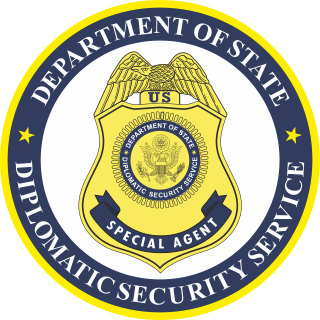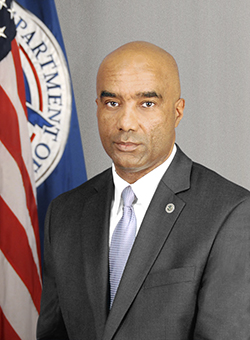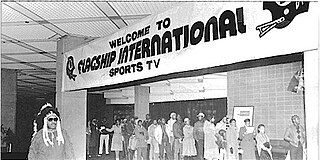
The United States Department of Justice (DOJ), also known as the Justice Department, is a federal executive department of the United States government tasked with the enforcement of federal law and administration of justice in the United States. It is equivalent to the justice or interior ministries of other countries. The department is headed by the U.S. attorney general, who reports directly to the president of the United States and is a member of the president's Cabinet. The current attorney general is Merrick Garland, who has served since March 2021.

In law enforcement, a sting operation is a deceptive operation designed to catch a person attempting to commit a crime. A typical sting will have an undercover law enforcement officer, detective, or co-operative member of the public play a role as criminal partner or potential victim and go along with a suspect's actions to gather evidence of the suspect's wrongdoing. Mass media journalists occasionally resort to sting operations to record video and broadcast to expose criminal activity.

The United States Marshals Service (USMS) is a federal law enforcement agency in the United States. The Marshals Service serves as the enforcement and security arm of the U.S. federal judiciary, although it is an agency of the U.S. Department of Justice and operates under the direction of the U.S. Attorney General. It is the oldest U.S. federal law enforcement agency, created by the Judiciary Act of 1789 during the presidency of George Washington as the "Office of the United States Marshal". The USMS as it stands today was established in 1969 to provide guidance and assistance to U.S. Marshals throughout the federal judicial districts.
U.S. Immigration and Customs Enforcement is a federal law enforcement agency under the U.S. Department of Homeland Security. ICE's stated mission is to protect the United States from cross-border crime and undocumented immigration that threaten national security and public safety.

The Justice Prisoner and Alien Transportation System (JPATS), nicknamed "Con Air", is a United States Marshals Service airline charged with the transportation of persons in legal custody between prisons, detention centers, courthouses, and other locations. It is the largest prison transport network in the world. Though primarily used by the Federal Bureau of Prisons or U.S. Immigration and Customs Enforcement, JPATS also assists military and state law enforcement.

United States Customs and Border Protection (CBP) is the largest federal law enforcement agency of the United States Department of Homeland Security. It is the country's primary border control organization, charged with regulating and facilitating international trade, collecting import duties, as well as enforcing U.S. regulations, including trade, customs and immigration. CBP is one of the largest law enforcement agencies in the United States. It has a workforce of more than 45,600 federal agents and officers. It is headquartered in Washington, D.C.

The United States District Court for the District of Vermont is the federal district court whose jurisdiction is the federal district of Vermont. The court has locations in Brattleboro, Burlington, and Rutland. The court was created by a March 2, 1791 amendment to the Judiciary Act of 1789 and assigned to the eastern circuit. Under the Midnight Judges Act, the Circuits were reorganized and this court was assigned to the United States Court of Appeals for the Second Circuit where it has remained since. Originally created with one judgeship, in 1966 a second judgeship was added.

The Federal Air Marshal Service (FAMS) is a United States federal law enforcement agency under the supervision of the Transportation Security Administration (TSA) of the United States Department of Homeland Security (DHS).

The Bureau of Diplomatic Security, commonly known as Diplomatic Security (DS), is the security branch of the United States Department of State. It conducts international investigations, threat analysis, cyber security, counterterrorism, and protection of people, property, and information. Its mission is to provide a safe and secure environment for officials to execute the foreign policy of the United States.

The Diplomatic Security Service (DSS) is the principal security and law enforcement agency of the United States Department of State (DOS). As the operational division of DOS Bureau of Diplomatic Security, its primary mission is to provide security to protect diplomatic assets, personnel, and information, and combat visa and passport fraud. DSS also conducts counterterrorism, counterintelligence, cybersecurity and criminal investigations domestically and abroad.

The Federal Protective Service (FPS) is a federal law enforcement agency of the United States Department of Homeland Security (DHS). It is also "the federal agency charged with protecting and delivering integrated law enforcement and security services to facilities owned or leased by the General Services Administration (GSA)"—over 9,000 buildings—and their occupants.

Operation FALCON is the name of several week-long dragnets organized by the United States Marshals Service. FALCON I occurred between April 4 and 10, 2005, FALCON II during the week of April 17–23, 2006, and FALCON III from October 22–28, 2006.

The Alaska State Troopers, officially the Division of Alaska State Troopers (AST), is the state police agency of the U.S. state of Alaska. It is a division of the Alaska Department of Public Safety (DPS). The AST is a full-service law enforcement agency that handles both traffic and criminal law enforcement. The AST is also involved in apprehending fugitives as part of the Alaska Fugitive Task Force, an inter-agency collaborative of Alaska police departments that cooperates with police agencies throughout the United States and less commonly with Interpol in apprehending wanted men and women. Unlike many lower 48 states, the AST also serves as Alaska’s primary environmental law enforcement agency; troopers assigned to the AST’s Division of Alaska Wildlife Troopers are known as "Alaska Wildlife Troopers" and primarily serve as game wardens, although they retain the same powers as other Alaskan state troopers.

The Organized Crime Drug Enforcement Task Force (OCDETF) is a federal drug enforcement program in the United States, overseen by the Attorney General and the Department of Justice. The principal mission of the OCDETF program is to identify, disrupt, and dismantle the major drug trafficking operations and tackle related crimes, such as money laundering, tax and weapon violations, and violent crime, and prosecute those primarily responsible for the nation's drug supply.

In 1985, the Fugitive Investigative Strike Team VIII, part of the United States Marshals Service, set up Puño Airlines, a front organization to lure wanted criminals into the open where they could be arrested – by sending a letter suggesting the fugitive had won a free flight, a weekend in the Bahamas, and $350 in spending money. In total, 200 fugitives were sent the offer, and 14 were arrested after showing up to claim their winnings.

The Fugitive Felon Act, abbreviated FFA, is a United States federal law that criminalizes interstate flight in order to avoid prosecution or giving testimony in state felony proceedings, a crime termed unlawful flight.

Roderick "Rod" Allison was the Acting Deputy Administrator of the Transportation Security Administration and Director of the Federal Air Marshal Service.

Operation Flagship was a sting operation jointly organized by the United States Marshals Service and the Metropolitan Police Department in Washington, D.C. that resulted in the arrest of 101 wanted fugitives on December 15, 1985.

The director of the United States Marshals Service, abbreviated USMS director, is the head of the United States Marshals Service (USMS). The director oversees and manages the operations of the Marshals Service and directly superintends the various United States Marshals, which lead all USMS personnel within their respective federal judicial district. The director was originally referred to as "Chief United States Marshal" from 1957 to 1970.

Law enforcement authorities fatally shot Winston Boogie Smith Jr., a 32-year-old black American man, in the Uptown area of Minneapolis at 2:08 p.m. CDT on June 3, 2021. Smith was being pursued by a U.S. Marshals Service task force that apprehends wanted fugitives. The arrest operation had the participation of undercover agents from several local police agencies in Minnesota. The officers did not use body cameras or dashcams when apprehending Smith. Controversy over the lack of law enforcement footage of the arrest operation led to local police agencies ceasing aid to the Marshals Service's fugitive task force, and to changes to body and dash camera policies by the Marshals and other federal law enforcement agencies.



















